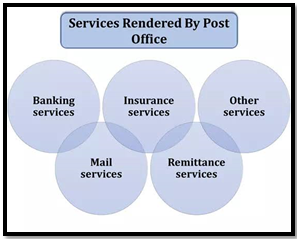THE POST OFFICE BILL, 2023
Why in the News?
The Post Office Bill, 2023 aims to replace the Indian Post Office Act, 1898, in response to the evolving nature of services provided by the Post Office.
Key Provisions:
Diversification of Services:
- Over time, the Post Office extended beyond mail services to offer various citizen-centric services.
- The new Bill aligns with these changes, necessitating the repeal of the outdated 1898 Act.
Security Measures – Section 9:
- Empowerment: The Centre can authorize officers to intercept, open, or detain items for reasons like state security, friendly relations, public order, emergencies, safety, or law contravention.
- Customs Authority: Post officers may hand over items suspected of containing prohibited substances to customs authorities.
Liability Exemption – Section 10:
- The Post Office and its officers are exempt from liability for loss, mis-delivery, delay, or damage in the course of any service, except as prescribed.
Penal Provision – Charges Recovery:
- Individuals refusing to pay for Post Office services can face recovery of charges as arrears of land revenue.
Source: Flexiprep
Criticisms and Opposition:
- Mail Interception: Several Opposition members criticize provisions allowing interception of mail.
- Liability Exemption: Concerns raised regarding the exemption of the Post Office from liability for various service-related issues.
Differences between Acts:
- The 2023 Bill expands government authority to intercept any postal article, not just letters.
- Penalties and offences under the 1898 Act were removed by the Jan Vishwas Act of 2023, altering the legal landscape.
- Sections 19, 25, and 26 of the 1898 Act shared similarities with Section 9 of the 2023 Bill, allowing interception of specified items.
- The 2023 Bill removes the 1898 Act’s Section 4, which granted the Centre the exclusive privilege over conveying letters.
This legislative update addresses the need for modernization while raising concerns about privacy and liability.

 Source: Flexiprep
Source: Flexiprep

